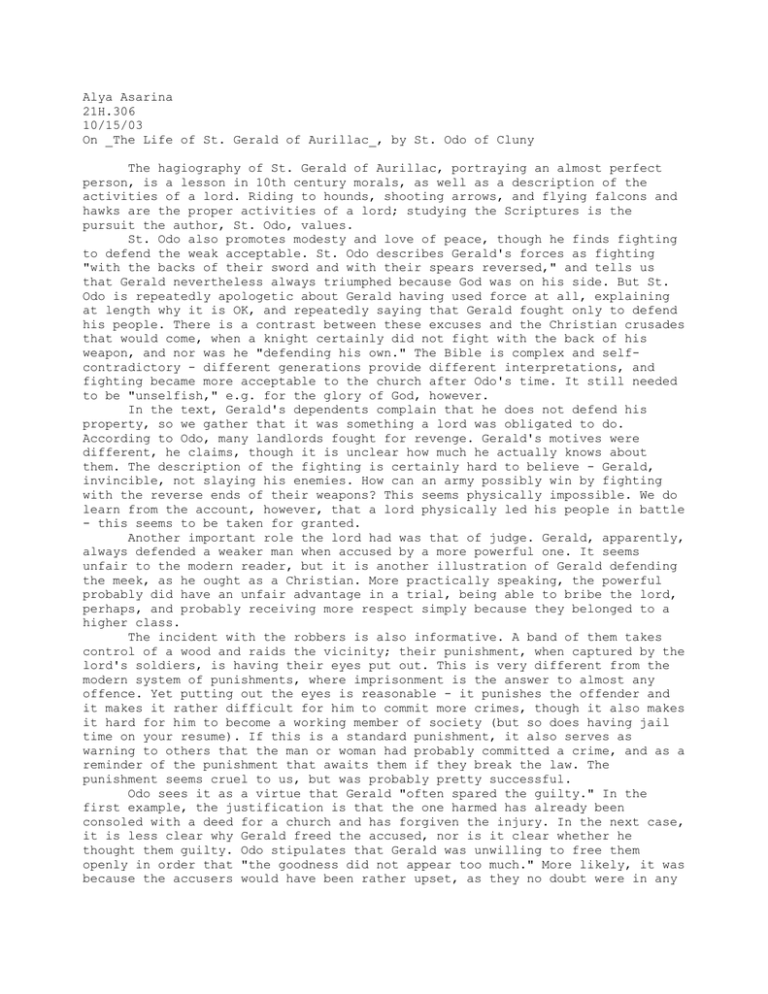Alya Asarina 21H.306 10/15/03
advertisement

Alya Asarina 21H.306 10/15/03 On _The Life of St. Gerald of Aurillac_, by St. Odo of Cluny The hagiography of St. Gerald of Aurillac, portraying an almost perfect person, is a lesson in 10th century morals, as well as a description of the activities of a lord. Riding to hounds, shooting arrows, and flying falcons and hawks are the proper activities of a lord; studying the Scriptures is the pursuit the author, St. Odo, values. St. Odo also promotes modesty and love of peace, though he finds fighting to defend the weak acceptable. St. Odo describes Gerald's forces as fighting "with the backs of their sword and with their spears reversed," and tells us that Gerald nevertheless always triumphed because God was on his side. But St. Odo is repeatedly apologetic about Gerald having used force at all, explaining at length why it is OK, and repeatedly saying that Gerald fought only to defend his people. There is a contrast between these excuses and the Christian crusades that would come, when a knight certainly did not fight with the back of his weapon, and nor was he "defending his own." The Bible is complex and selfcontradictory - different generations provide different interpretations, and fighting became more acceptable to the church after Odo's time. It still needed to be "unselfish," e.g. for the glory of God, however. In the text, Gerald's dependents complain that he does not defend his property, so we gather that it was something a lord was obligated to do. According to Odo, many landlords fought for revenge. Gerald's motives were different, he claims, though it is unclear how much he actually knows about them. The description of the fighting is certainly hard to believe - Gerald, invincible, not slaying his enemies. How can an army possibly win by fighting with the reverse ends of their weapons? This seems physically impossible. We do learn from the account, however, that a lord physically led his people in battle - this seems to be taken for granted. Another important role the lord had was that of judge. Gerald, apparently, always defended a weaker man when accused by a more powerful one. It seems unfair to the modern reader, but it is another illustration of Gerald defending the meek, as he ought as a Christian. More practically speaking, the powerful probably did have an unfair advantage in a trial, being able to bribe the lord, perhaps, and probably receiving more respect simply because they belonged to a higher class. The incident with the robbers is also informative. A band of them takes control of a wood and raids the vicinity; their punishment, when captured by the lord's soldiers, is having their eyes put out. This is very different from the modern system of punishments, where imprisonment is the answer to almost any offence. Yet putting out the eyes is reasonable - it punishes the offender and it makes it rather difficult for him to commit more crimes, though it also makes it hard for him to become a working member of society (but so does having jail time on your resume). If this is a standard punishment, it also serves as warning to others that the man or woman had probably committed a crime, and as a reminder of the punishment that awaits them if they break the law. The punishment seems cruel to us, but was probably pretty successful. Odo sees it as a virtue that Gerald "often spared the guilty." In the first example, the justification is that the one harmed has already been consoled with a deed for a church and has forgiven the injury. In the next case, it is less clear why Gerald freed the accused, nor is it clear whether he thought them guilty. Odo stipulates that Gerald was unwilling to free them openly in order that "the goodness did not appear too much." More likely, it was because the accusers would have been rather upset, as they no doubt were in any case. Not knowing who the accusers were, it's hard to say what they could have done had Gerald ordered the accused to be freed directly. The account shows that imprisonment was not a form of punishment, perhaps because prisons are expensive to maintain and the lords would not have been willing to maintain them. Instead, maiming (e.g. putting out the eyes), death, fines, and branding are acceptable punishments. There appears to be no clear standard that would match punishment to offence - it's the lord's call, and will therefore depend on the lord holding trial and on the feelings the lord has about the particular case. Gerald, apparently, did nothing to those who had committed a crime inadvertently, which Odo believes is the right choice. The account ends with some of Gerald's peasants leaving the land. Perhaps, then, he was not a satisfactory lord. Gerald's humanitarianism appears impractical. If someone has wronged you, and the lord lets them go, you will not be pleased with his mildness. Most of the contrasts between Gerald and other lords probably did not make Gerald the better lord.

